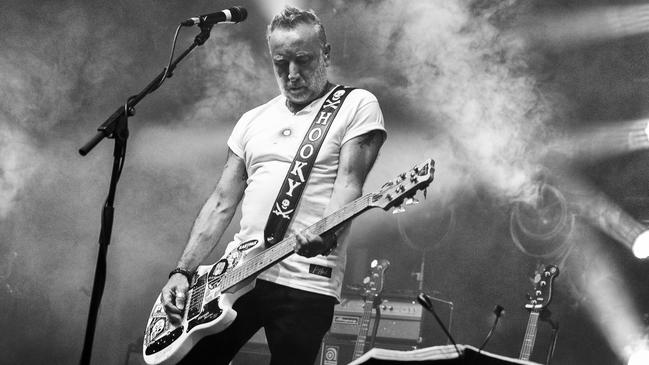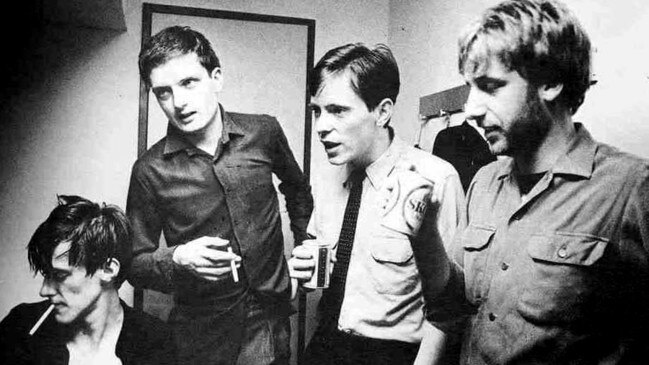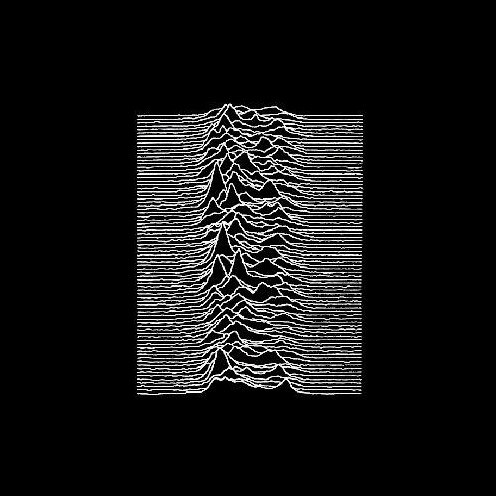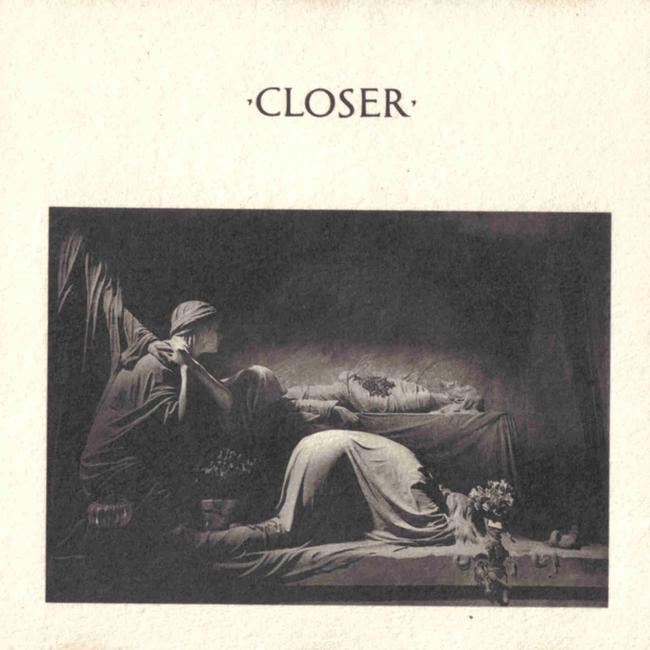Peter Hook brings Joy Division albums Unknown Pleasures, Closer to a new generation
Peter Hook is bringing his old band’s two albums to life in Australia – a remarkable showcase of what might have been.

In 1819, the working classes of Manchester had little food, no vote and no future. When they gathered in St Peter’s Field on August 16 to protest about their grievances, cavalry summoned by local magistrates charged with their unsheathed sabres killing perhaps 17 locals, including a baby. It was anarchy.
To commemorate what is known as the Peterloo Massacre, in 1846 the city of Manchester built the Free Trade Hall over the site.
Some famous people and events have echoed throughout its dark corridors. Charles Dickens performed there, Benjamin Disraeli and Winston Churchill gave speeches there. The Germans bombed it in 1940. In 1966, an audience member famously shouted “Judas” to Bob Dylan as he betrayed folk purists and plugged in his Fender Stratocaster having “gone electric” the year before.
But by far, the most influential event there took place on Friday, June 4, 1976. Just days into a record-breaking sweaty summer, the soon-to-be hottest band in England played the Free Trade Hall. About 40 or so fans – some underfed, most too young to vote and many convinced they had no future, turned up to see the Sex Pistols. A decade on from Dylan, a decade before Live Aid, this would be the most influential gig in history.
If everybody who claims to have been at that show really was they’d still be filing out. Among the few dozen to witness the shambolic, but crudely potent performance were Howard Devoto and his mate Pete Shelley. They had driven down to London to track down Sex Pistols’ manager Malcolm McLaren to organise the gig. Days later, they were on stage themselves as the Buzzcocks. Steven Morrissey was there and he would form The Smiths. Mark E Smith was there and formed The Fall.
Also at the disordered, messy set were Peter Hook and his childhood friend, Bernard Sumner. Leaving after Johnny Rotten had sung the last lines of The Stooges’ song No Fun – for the second time that night – and abused his audience, Hook looked at Sumner: “We can do that!”
Hook borrowed the money to buy a bass guitar the following day and with Sumner would form Joy Division with Ian Curtis, who they would encounter at a better attended Sex Pistols show weeks later.
English punk rock was born that June night, and so, too, the post-punk bands that would quickly replace it.
“I used to read the music press cover to cover, so I was quite well versed in the story of the Sex Pistols,” Hook explained on the eve of an Australian tour that kicks off tonight at Melbourne’s Croxton Bandroom. He was quite looking forward to a band that fought with their audience, which was quite a change from the acts he and Sumner usually saw, the most recent of which had been Deep Purple.
“I remember going up to the window to pay and Malcolm McLaren was all dressed in black leather and he took my 50 pence off me,” Hook recalled. “There was about 40 people there. The Sex Pistols came on and it was the complete antithesis of anything we’d seen before. They didn’t give a shit about the audience. They spent most of the time telling us to f..k off.”
Band members stood with their backs to the small gathering of mostly informed fans and there was wailing feedback. “It sounded awful. It was the worst thing I’d ever heard, but the best thing I’d ever seen.”
Having decided to enlist in the punk movement, Sumner told Hook he needed to get a bass guitar. “I said ‘yeah, yeah’, not even knowing what a bass guitar was. The next evening we were practising in his gran’s front room.”
He wanted to sound like Jean-Jacques Burnel, the bass player with The Stranglers, and look like Paul Simonon, bass player with The Clash. The other day, Hook saw an Instagram promotion for “advanced bass lessons”.
“It said ‘Take this simple quiz to find out where you are in your career’,” said Hook. “So I’m doing this quiz about bass playing and it put me at beginner.”
Nonetheless, Hook’s fast-developing inventive, muscular bass playing pushed him beyond the rhythm section and into the leading role as is witnessed on Joy Division’s era-defining single Love Will Tear Us Apart. It was New Musical Express single of the year in 1980. More than two decades later, that same newspaper named it the greatest single ever. Rolling Stone magazine has tended to lean away from English punk and post-punk but Love Will Tear Us Apart still came in at 181 on its 2011 list of the 500 greatest songs of all time. Last year, it leapt to 41.
The lyrics reflect the complicated life of singer Ian Curtis, who, depressed and epileptic, had just weeks to live when it was recorded. You can hear the helplessness of his situation and his marriage coming apart as his baritone slides down to bass in the atmosphere of gloom at the end of each line:
When routine bites hard and ambitions are low.
And resentment rides high but emotions won’t grow.
A distressed Curtis, trapped in shafts of darkness, is about to give up. He wants you to look about and share his fear. On May 18, 1980, he took his life days before Joy Division were to embark on a North American tour.
The Sex Pistols recorded just one album – Never Mind The Bollocks, not long after the Manchester shows – and the band that was inspired by those nights recorded just two: Unknown Pleasures, released in 1979, and Closer, released weeks after Curtis’s death. Unknown Pleasures is regularly described as a creation before its time, so too Closer. But the truth is that neither is even of their time. Unknown Pleasures failed to chart, but Curtis’s death and Closer’s success dragged it up to No. 71 a year later.

With Curtis gone, Joy Division called it a day. The band’s work was done and the world could catch up later. Hook is in Australia (as Peter Hook and The Light) to play both albums with an opening set of songs from New Order, the band that he, Sumner and Joy Division drummer Stephen Morris formed even as Closer lingered in the charts. New Order pioneered an electronica, ambient dance sound that – while influenced by Kraftwerk – prefigured many of the music styles of the later 1980s, including synth pop, Ibiza chillout and trance.
The hit single Blue Monday captured the essence of it all, particularly with its melodic bass that was in your face and in your ear. The programmed drum patterns, and keyboards arrive from different hemispheres and are bound together by Hook’s irresistible bass line that might be a twin to Sylvester’s 1978 disco hit You Make Me Feel (Mighty Real).
Blue Monday’s extraordinary journey through the British charts, starting in March 1983, is unmatched by any other song. It has returned on four occasions reaching as high as No.3 five years later. It rose to No.13 on the Australian charts when first released and shot back to No.6 when remixed in 1988.
But that’s well in the past for Hook. He hasn’t played in the band since 2007. He and the others clashed over royalties and other issues in a regrettable dispute that was not settled until 2017. Hook and Sumner no longer speak.
If Hook follows recent set lists – he performed in Belfast last Saturday – he will start with half a dozen New Order songs, perhaps ending that bracket with Blue Monday. Then the band will perform, in original track list order, the Joy Division albums, and he’ll wrap up with some non-album singles – Atmosphere, Ceremony (originally a Joy Division song repurposed for New Order), Transmission and, of course, Love Will Tear Us Apart, which appeared on neither album. It will bring the house down, and does every night from Maastricht to Melbourne. It came in at 3.29 minutes originally, but the live version will thunder for an almost unstoppable 6 minutes.
The biggest challenge comes with Atrocity Exhibition, the opening track on Closer, that also goes for 6 minutes. As with all the band’s songs, it was produced by the brilliantly eccentric Martin Hannett, whose Manchester tombstone states, with justified authority, “Creator of The Manchester Sound”. (Hannett is buried at the city’s Southern Cemetery not far from Joy Division’s Factory Records boss Tony Wilson, and the former manager of both Joy Division and New Order, Rob Gretton. The Smiths’ song Cemetry [sic] Gates is about the site.)
Hook was never happy with the wild additions made to Atrocity Exhibition in the studio the day after it was recorded.
“Martin Hannett took the song in a completely different direction,” recalled Hook. “I played guitar on Atrocity Exhibition (swapping instruments with Sumner) so it had a different feel. Martin couldn’t get his head around the track.”


Hook has reverted to how he remembers Joy Division playing it. Not that he is out to copy his old band, stating, almost anti-intuitively: “I’ve strived not to sound like Joy Division.”
He said he can’t copy Joy Division. “And I don’t want to. My big bug bear with New Order is that I hate them pretending to be New Order, because they aren’t.”
But he is cognisant of the fact few saw Joy Division and today’s fans are familiar with them via their records. On stage, Joy Division was loud, aggressive, fast, “spiky” and “angular”. On record, it was a different group. “I’m celebrating the recorded side of Joy Division.”
He added that he wouldn’t dream of emulating the band where “someone as important Ian Curtis isn’t there”.
The loss of Curtis looms large, and while Hook and the others have enjoyed the reassuring milestones of middle age – marriage, children (he has three), schools, Christmases – he always makes room for the doomed singer. He passes the cemetery in Macclesfield, south of Manchester, regularly. “I visit Ian a lot, actually,” he said. “Sometimes it’s really nice to go in and say hello.”
When Curtis died, the band also “lost” Closer. While it was finished in the studio, many of the songs were never played live. And Hook prefers it, particularly, with the one exception, because of Hannett’s productions.
“To get them back and be able to play them is wonderful.”
Now that Hook is happily “covering” his own music, I ask him to rate some of the better-known covers of Joy Division songs:
Paul Young’s Love Will Tear Us Apart: “I am grateful to him for giving us the first money we actually earned, (but) from a musical point of view 4/10.”
Radiohead’s Ceremony: “I’ve never been a fan of Radiohead. 6/10 for effort.”
Grace Jones’s She Lost Control (the astonishing first cover of any of their songs, the prescient Jones’s reggae version is from 1979): “10/10.”
James Blake’s Atmosphere: “I actually love that. Fantastic version. 10/10 as well.”
Low’s Transmission: “I had never heard of Low, but we were talking about Low on the bus last night (Low’s drummer Mimi Parker died after a battle with cancer last Friday). I am going to listen to that as soon as I get rid of you!”
Details: metropolistouring.com


To join the conversation, please log in. Don't have an account? Register
Join the conversation, you are commenting as Logout